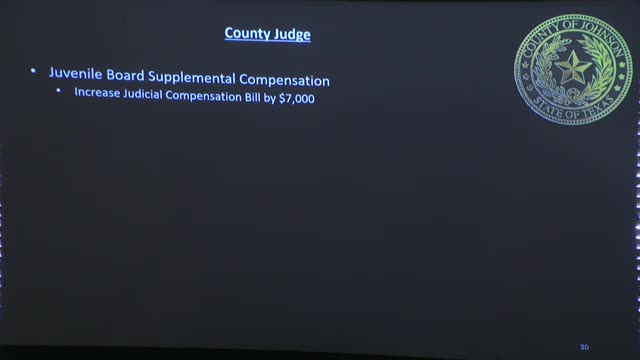Commissioner's Court Allocates Budget for Meals on Wheels and Indigent Cremations
August 05, 2025 | Johnson County, Texas
This article was created by AI summarizing key points discussed. AI makes mistakes, so for full details and context, please refer to the video of the full meeting. Please report any errors so we can fix them. Report an error »

In the heart of Johnson County, Texas, the Special Commissioner's Court convened on August 5, 2025, to discuss pressing budgetary matters that impact the community. As the meeting unfolded, the atmosphere was punctuated by the distant wail of an ambulance, a reminder of the essential services that the county provides.
One of the key topics was the reallocation of funds within the county's budget. The court decided to move all dues, conferences, and training expenses out of the road and bridge fund and into the general fund. This strategic shift is expected to free up approximately $10,000 per precinct, allowing for more flexibility in managing resources. The rationale behind this decision was clear: while training related to road and bridge operations is vital, many of the training sessions attended by commissioners extend beyond that scope.
The discussion also touched on the county's commitment to vital services like Meals on Wheels, which saw a modest increase in funding from $83,000 to $85,480. This adjustment reflects the ongoing need to support the elderly and vulnerable populations in the community. Additionally, the court noted the importance of the North Central Texas Council of Governments (NCT COG) matching grant, which provides substantial funding for Meals on Wheels, emphasizing the county's dedication to ensuring that no one goes hungry.
Another significant point of discussion was the county's operating reserve, currently set at $300,000. The court plans to adjust this figure to $250,000, maintaining a balance that has been consistent over the past several years. This reserve includes funds for fuel and personnel, ensuring that the county can respond effectively to emergencies and operational needs.
A particularly poignant moment arose when the topic of indigent cremations was brought to light. The court acknowledged the financial burden these obligations place on the county budget. Each year, Johnson County is responsible for the cremation of individuals who pass away without financial means or family support. The estimated cost for these services is around $12,000 to $15,000 annually. The court's commitment to handling these cases with dignity and respect was evident, as they discussed the processes in place to manage these sensitive situations.
As the meeting concluded, it was clear that the decisions made by the Special Commissioner's Court would have lasting implications for the residents of Johnson County. The careful management of funds and the prioritization of essential services reflect a community dedicated to supporting its most vulnerable members while maintaining fiscal responsibility. The court's discussions not only addressed immediate budgetary concerns but also highlighted the ongoing commitment to the welfare of all citizens in the county.
One of the key topics was the reallocation of funds within the county's budget. The court decided to move all dues, conferences, and training expenses out of the road and bridge fund and into the general fund. This strategic shift is expected to free up approximately $10,000 per precinct, allowing for more flexibility in managing resources. The rationale behind this decision was clear: while training related to road and bridge operations is vital, many of the training sessions attended by commissioners extend beyond that scope.
The discussion also touched on the county's commitment to vital services like Meals on Wheels, which saw a modest increase in funding from $83,000 to $85,480. This adjustment reflects the ongoing need to support the elderly and vulnerable populations in the community. Additionally, the court noted the importance of the North Central Texas Council of Governments (NCT COG) matching grant, which provides substantial funding for Meals on Wheels, emphasizing the county's dedication to ensuring that no one goes hungry.
Another significant point of discussion was the county's operating reserve, currently set at $300,000. The court plans to adjust this figure to $250,000, maintaining a balance that has been consistent over the past several years. This reserve includes funds for fuel and personnel, ensuring that the county can respond effectively to emergencies and operational needs.
A particularly poignant moment arose when the topic of indigent cremations was brought to light. The court acknowledged the financial burden these obligations place on the county budget. Each year, Johnson County is responsible for the cremation of individuals who pass away without financial means or family support. The estimated cost for these services is around $12,000 to $15,000 annually. The court's commitment to handling these cases with dignity and respect was evident, as they discussed the processes in place to manage these sensitive situations.
As the meeting concluded, it was clear that the decisions made by the Special Commissioner's Court would have lasting implications for the residents of Johnson County. The careful management of funds and the prioritization of essential services reflect a community dedicated to supporting its most vulnerable members while maintaining fiscal responsibility. The court's discussions not only addressed immediate budgetary concerns but also highlighted the ongoing commitment to the welfare of all citizens in the county.
View full meeting
This article is based on a recent meeting—watch the full video and explore the complete transcript for deeper insights into the discussion.
View full meeting
